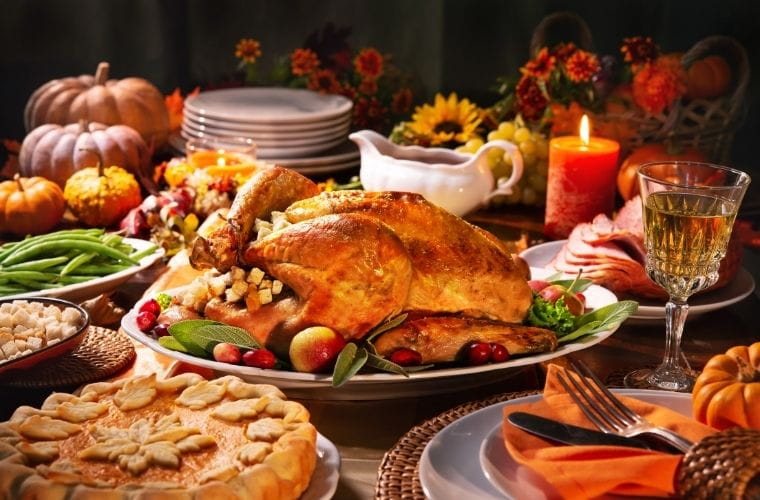How Long Is Too Long? Safe Tips for Thanksgiving Leftovers

The best part of Thanksgiving might just be the leftovers. From turkey sandwiches to reheated sides, those post-holiday meals keep the celebration going all weekend. But before you dig into that second (or third) round of stuffing, it’s important to make sure your leftovers are stored and reheated safely.
“Foodborne illness peaks around the holidays because we’re often cooking larger quantities and leaving food out longer than usual,” said Crystal Thompson, Mease Dunedin Hospital’s food and nutrition manager. “With just a few precautions, you can enjoy your leftovers without any unwanted surprises.”
1. Chill Food Promptly
Don’t let food linger too long around the table. According to the U.S. Department of Agriculture, food should not sit out for more than two hours. Bacteria grow fastest between 40°F and 140°F — what food safety experts call the “danger zone.”
Most people don’t realize their fridge may run warmer than 40°F, so keeping a small thermometer inside can help ensure your leftovers stay truly cold and safe.
“Get those leftovers into shallow containers and into the fridge quickly,” added Thompson. “The faster food cools, the safer it stays.”
2. Store Smart
Refrigerated leftovers are best enjoyed within three to four days. If you know you won’t finish them in that time, freeze them right away. Most dishes — turkey, stuffing, casseroles and gravy — can be safely frozen for up to two to six months.
Turkey tastes best if eaten or frozen within two days, before it starts drying out. To preserve flavor, wrap portions tightly in foil before sealing them in a freezer-safe bag. Label each bag with the date — frozen food is safest indefinitely, but quality drops after about six months.
“It’s easy to think reheating until it’s hot is enough,” said Thompson. “But bacteria can survive lukewarm temperatures. Always aim for that 165°F mark when reheating.”
3. Keep It Clean
Wash hands, utensils and surfaces often, especially when handling raw meats or reheating foods. Use separate cutting boards for meat and produce to avoid cross-contamination.
Your kitchen sponge might be dirtier than you think — the average sponge contains more bacteria than a household trash can. To sanitize it, microwave a damp sponge for 30 seconds or switch to disposable wipes when cleaning up after turkey prep.
4. Watch for Warning Signs
When in doubt, throw it out. If food smells off, looks slimy or has mold, don’t taste it. Even a small amount of spoiled food can cause illness.
Some bacteria that cause foodborne illness don’t change how food looks or smells. That’s why temperature and timing, not just your nose, are your best protection.“Your senses are your best defense,” added Thompson, “but safe handling habits matter just as much.”
5. Get Creative with Leftovers
If you’re running out of ideas, turn leftovers into something new—this is where Thanksgiving can still feel fun after the holiday. One of the best ways to get extra mileage from your meal is to turn the turkey carcass into a comforting homemade broth by simmering it with onion, carrot, celery and herbs. Freeze in small containers and use it for soups or quick weeknight meals in the months ahead.
From there, the possibilities are endless:
- Build a post-holiday turkey sandwich on hearty bread with cranberry spread and stuffing.
- Stir up a cozy turkey pot pie or turkey ala king using whatever vegetables you have on hand.
- Lighten things up with turkey salad in lettuce cups or a turkey Cobb salad.
- Or try a white bean turkey chili as a flavorful, lighter twist on the classic.
The average American consumes between 3,000 and 4,500 calories on Thanksgiving Day — more than twice the daily recommendation. Repurposing leftovers into balanced meals lets your holiday flavors live on while keeping things a bit lighter.
“Thanksgiving leftovers are meant to be enjoyed, not feared,” said Thompson. “A little planning and attention to safety go a long way in keeping your family healthy through the holidays.”
With safe storage, a little creativity and a touch of food science, your Thanksgiving feast can continue to bring joy — without the risk.
If you or a loved one start to feel sick after the holiday, it may be more than “just something you ate.” BayCare Urgent Care provides walk-in care for adults and children 6 months and older, including evenings and weekends. Get the care you need, when you need it.
Find a location near you: BayCare Urgent Care
